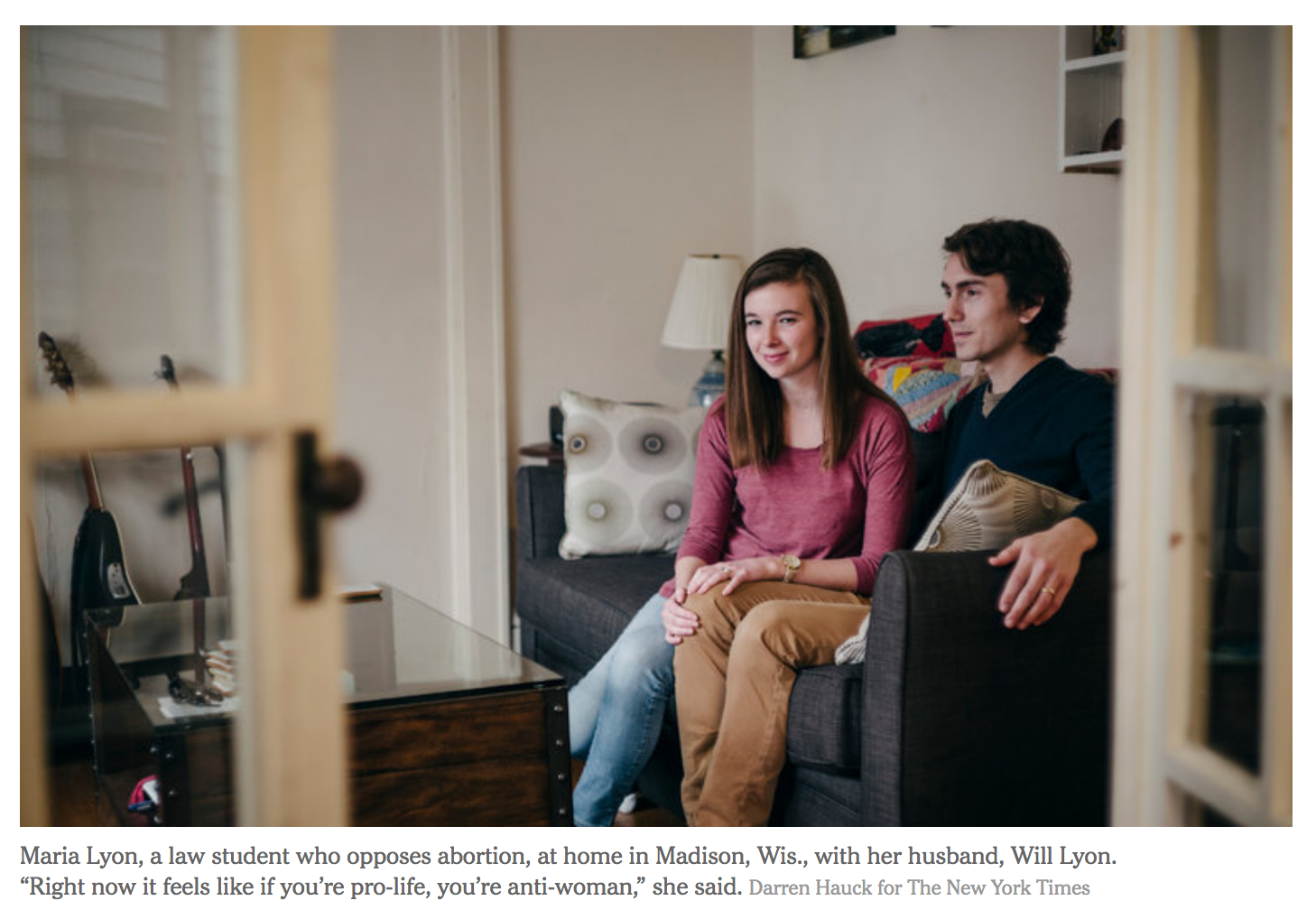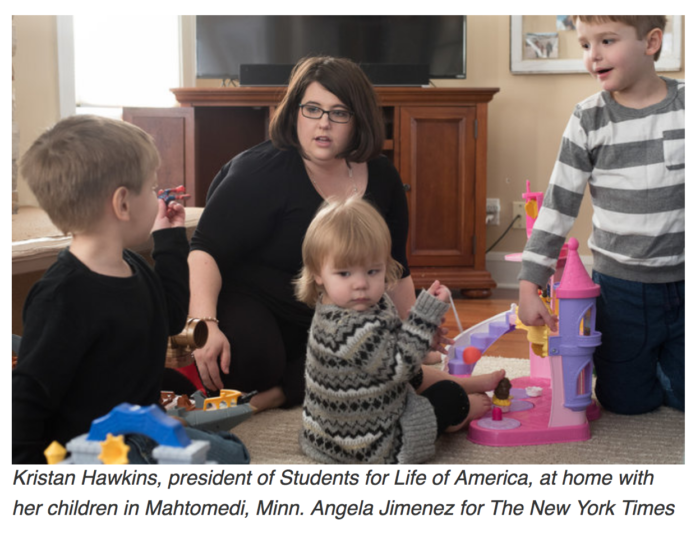Now these tensions, which have simmered behind the scenes, are spilling out into the open.
On Monday, march organizers revoked so-called partnership status – a kind of official recognition — for a Texas anti-abortion group, New Wave Feminists. (Ms. Sarsour called the initial decision to include the group “a mistake.”)
Many anti-abortion women like Ms. Lyon are simply staying home. But one group, Students for Life of America, which organizes college students to oppose abortion, does plan to march, banners and all. Kristan Hawkins, its president, a 31-year-old mother of four, said she, too, made a request for partnership status, which she said was ignored.
She said her marchers will wear Go-Pro cameras: “When they start spitting and screaming at us it will be helpful.”
The march comes as abortion foes are newly emboldened by the election of Mr. Trump. He won the support of 53 percent of white women, who flocked to him primarily for economic reasons, pollsters said, but also because he made explicit promises to overturn Roe v. Wade, the 1973 Supreme Court decision that found a right to abortion within the privacy protections of the Constitution.
Abortion opponents will mark the 44th anniversary of the landmark ruling with their own event, the March for Life, next week. Kellyanne Conway, who will be Mr. Trump’s White House counselor after becoming the first woman to manage a successful presidential campaign, will speak at that march.
At the same time, Republicans on Capitol Hill are threatening to withdraw taxpayer funding for Planned Parenthood, the reproductive rights behemoth. The group is the lead financial sponsor of the Women’s March and is helping to organize the event, along with Naral Pro-Choice America and other abortion-rights organizations. Their participation makes it clear: Abortion opponents are out of step with the march.
“Reproductive freedom or reproductive justice means that women decide the fate of our own bodies,” Gloria Steinem, an honorary co-chairwoman of the march, wrote in an email message. She said if women “want to make decisions over their own bodies themselves, and want other women to have the same power, then they should feel very welcome at the march.”
Yet many women do not. Among them is Charmaine Yoest, a vocal opponent of abortion who is a senior fellow at American Values, a conservative organization here.
“This is what we conservative women live with all the time, this idea that we somehow aren’t really women and we just reflect internalized misogyny,” she said. Of the march, she added: “I don’t think they represent women. I think they are a wholly owned subsidiary of the abortion movement.”
The relationship, and sometimes tension, between reproductive rights and feminism goes back decades, to the inception of so-called second wave feminism in the 1960s; the first wave culminated in women winning the right to vote. Its pioneers, echoing the American left’s fight for racial justice and its opposition to the Vietnam War, embraced the birth control pill as a way to give women more power over their own lives. Thus a sexual revolution was born.
In 1973, just as middle-class women were abandoning homemaking for the work force, inspired by writers like Ms. Steinem and Betty Friedan, the Supreme Court handed down Roe v. Wade. That drove a wedge in the women’s movement, said Carole Joffe, a sociologist and reproductive rights advocate at the University of California, San Francisco.
While many feminists saw the right to abortion as essential to women’s empowerment, she said, the decision also galvanized “what we now call the religious right” — Catholics, Protestants and evangelical Christians, as well as churchgoing African-Americans, a number of whom considered themselves liberal on other issues.
“I think this march will be discussed for a very long time, because this march raises in a very powerful way the question of who can rightfully be called a feminist, what does feminist organizing mean in the 21st century,” Ms. Joffe said. “Is it even possible to have a conception of American feminism that does not involve pro-choice and pro-contraception?”

Public sentiment on abortion has remained remarkably consistent over time. According to a Pew survey conducted after the election, 7 in 10 Americans oppose overturning Roe v. Wade. Democrats have historically been more in favor of abortion rights than Republicans, but despite a perception that women are more supportive than men, there is often little daylight between the sexes on the issue.
Celinda Lake, a Democratic pollster, said that is because the question is inextricably tied to faith, and women tend to be more religious than men.
With so many causes being represented — from family leave legislation to gay rights to better police treatment of minorities to access to abortion — some disagreements were inevitable. Some Facebook pages for the various marches around the country have broken out in contentious conflicts over ethnicity and race, including whether it was necessary for white women to take a back seat in leading the march.
Officials of Planned Parenthood and Naral, however, say that as soon as word of the march started spreading, their members across the country began asking what they could do. Both groups have a powerful presence here in the capital and are expert at organizing protests.
“There have been some stories about anti-choice folks trying to show up in protest; I’m not worried about them — they’re going to be drowned out by hundreds of thousands of folks,” Mitchell Stille, Naral’s national political director, said in an interview. Asked if those women could march in solidarity with the march, Mr. Stille sounded irked.
“Anti-choice women voted overwhelmingly for Donald Trump,” he said. “They got exactly what they wanted, so I’m not sure exactly what the solidarity of that would be.”
Ms. Lyon, the law student, did not vote for Mr. Trump; she said she could not support either him or Mrs. Clinton, and picked a third-party candidate.
Living in the liberal-leaning city of Madison, she often feels isolated for her views, which she said she came to through research that reinforced her Catholic beliefs. She also accepts the church’s ban on contraception, and sees her position as consistent with her pursuit of racial justice in prisons.
Asked to define feminism, she paused for a moment and said, ‘‘I would define it as the right to live out my womanhood.”
Source: Sheryl Gay Stolberg, nytimes.com
 Listen Online
Listen Online Watch Online
Watch Online Find a Station in Your Area
Find a Station in Your Area










 Listen Now
Listen Now Watch Online
Watch Online
